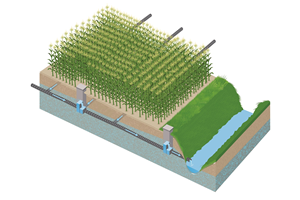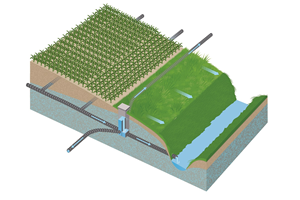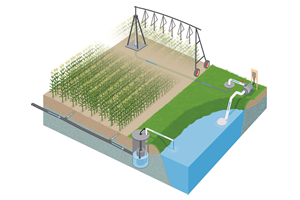Controlled drainage, also known as drainage water management, is the practice of using a water control structure to raise the depth of the … Read More

Project Outcome: Team members led the development of a new organization, the Conservation Drainage Network, to continue the work to transform drainage. … Read more
Project Outcome: Research was shared through Extension talks, media articles, publications, online tools, and the website visited by at least 33,000 people. … Read more
Project Outcome: The Transforming Drainage Database contains 206 site-years of data that can advance future research. … Read more
Project Outcome: Research resulted in 45 peer-reviewed papers, and was also disseminated through 59 conference papers and posters, and 167 conference presentations. … Read more
Project Outcome: Extension publications were co-authored by teams of Transforming Drainage researchers, peer-reviewed by experts, and are available online. … Read more
Project Outcome: NRCS Conservation Practice Standards 604 Saturated Buffer and 447 Irrigation and Drainage Tailwater Recovery were supported by project research. … Read more

Controlled drainage, also known as drainage water management, is the practice of using a water control structure to raise the depth of the … Read More

Saturated buffers store water within the soil profile of field buffers, by diverting tile water into shallow laterals that raise the water … Read More

Drainage water recycling is the practice of capturing excess water drained from fields, storing the drained water in a pond, a reservoir, or … Read More
Transforming Drainage is an 8-state research, extension, and education project aimed at increasing water storage in drained agricultural landscapes. The tools, strategies, and extension products were developed by the project team to enable agricultural producers and other decision-makers to access research-based information they need to make informed decisions about conservation drainage for increased resilience of crop production on drained land. The initial project was funded from 2015-2021 but information continues to be added and updated to keep these tools and resources current.
Contacts: Project Director Jane Frankenberger; Project Manager Ben Reinhart.




This material is based upon work that is supported by the National Institute of Food and Agriculture, U.S. Department of Agriculture, under award number 2015-68007-23193, “Managing Water for Increased Resiliency of Drained Agricultural Landscapes.” Any opinions, findings, conclusions, or recommendations expressed in this publication are those of the author(s) and do not necessarily reflect the view of the U.S. Department of Agriculture.
